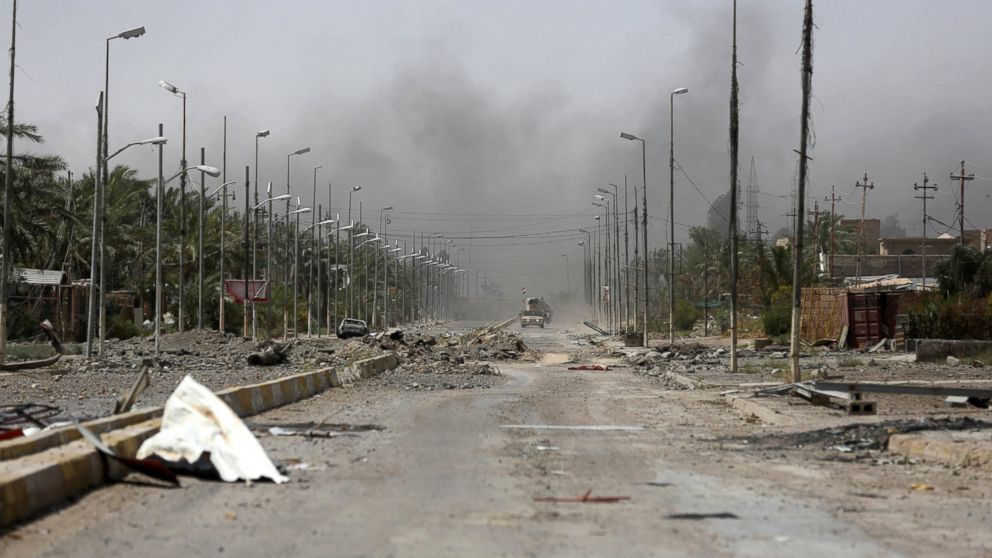Iraqi Government Is in Control of Fallujah, Pentagon Says
Fallujah was the first city taken over by ISIS in January 2014.

— -- The Iraqi government has recaptured the city of Fallujah from ISIS after a five-week campaign, the Pentagon said today.
Iraqi security forces have "100 percent control" of Fallujah, located 40 miles west of Baghdad, Pentagon officials said. Fallujah was the first city taken over by ISIS in January 2014.
"I congratulate Prime Minister Haider Al-Abadi and the Iraqi people for their progress in freeing the city of Fallujah from the grip of ISIL," Defense Secretary Ash Carter said in a statement released today by the Pentagon. ISIS is also known as ISIL.
"The United States military and our coalition partners are proud to have supported the Iraqi Security Forces under the prime minister's command in this important operation, which is another milestone in our joint efforts to accelerate ISIL's defeat, and to continue supporting our Iraqi partners moving forward," Carter added.
On Sunday, Lt. Gen. Abdul-Wahad al-Saadi, a senior Iraqi military commander involved in the Fallujah operation, had declared to the Associated Press that the city had been "fully liberated" from ISIS control.
Capt. Jeff Davis, a Pentagon spokesman, told reporters today that Iraqi security forces had "100 percent control" of the city. Davis said that after an initial tough fight into the city, the Iraqi military had was able to gain ground from ISIS after penetrating into the city center.
The offensive into Fallujah had been mounted by Iraq's elite Counterterrorism Service, the federal police, and provincial police while Shiite militia forces known as Popular Mobilization Forces remained outside the city.
More than 85,000 civilians fled the city as the battle for the heart of the city began two weeks ago. The United Nations has cited what it calls credible reports that some civilians fleeing Fallujah may have faced physical abuse at the hands of Iraqi security forces.
"It is also essential to complete the investigations the government of Iraq has launched to address alleged abuses of civilians," Carter said.
American officials have not publicly confirmed Iraqi pronouncements that 1,800 to 2,500 ISIS fighters were killed in the operation. U.S. officials had acknowledged that they did not have a clear picture of how many ISIS fighters may have been in Fallujah when Iraq launched its offensive on the city. They offered ranges of hundreds to possibly thousands.
Iraqi officials had prematurely declared victory after Iraqi forces took control of the municipal building located in the heart of the city.
"The operation in Fallujah has been a significant challenge for the ISF and for the coalition," Carter said. "It will not be the last. Hard fighting remains ahead, as does the vital task of caring for the residents of Fallujah displaced by ISIL's violence and beginning to rebuild the city so that its people may safely return."
The Iraqi government decided to mount the offensive on Fallujah to stem the rising number of ISIS bomb attacks in Baghdad that it was believed had originated in Fallujah. Davis acknowledged today that those attacks have continued as Fallujah was under siege for five weeks, which indicates the attacks are coming from elsewhere.
Despite that, Davis said Baghdad is safer as a result of Fallujah having been taken, given the city’s proximity to Baghdad.
The retaking of Fallujah will likely mean that the Iraqi government and military can set their sights on an offensive to retake Mosul, Iraq's second-largest city, which has been under ISIS control for two years.
The American military training effort in Iraq has been geared towards training the 25,000 Iraqi and Kurdish troops that will likely be needed for an offensive on Mosul. American officials have cautioned that it will be up to the Iraqis to retake Mosul, but that given current logistical shortfalls, an offensive was not likely this year.